 image: Brandy Martell, 400 block of 13th St near Frankland St, Oakland
image: Brandy Martell, 400 block of 13th St near Frankland St, Oakland
 image: Brandy Martell, 400 block of 13th St near Frankland St, Oakland image: Brandy Martell, 400 block of 13th St near Frankland St, Oakland ‘Tell all the truth', wrote the poet Emily Dickenson, 'but tell it slant’. For ‘The Truth must dazzle gradually/Or every one be blind.’[1] That is pretty much Mark’s Gospel’s account of resurrection, isn’t it? Whilst other resurrection stories were attached later, the two earliest, and arguably the best, manuscripts of Mark’s Gospel stop abruptly at verse 8 of chapter 16, with women fleeing from an empty tomb and ‘saying nothing to anyone, for they were afraid.’ Furthermore, the text simply stops in mid-sentence, with the little preposition which means ‘for’. Mark’s Gospel, at least, is clear that resurrection is both truly astounding and impossible to convey straightforwardly. For how do we describe resurrection? How do we communicate resurrection? How do we live resurrection? The nature of resurrection is that it involves strange truths of transformation: which require, like so much great art, ‘telling it slant’; which rest on mystery; and which revolve around deep, lived, experience. For art, mystery, and experience: these three things are at the heart of the strange truths of resurrection we exult in today, as witnessed to by our readings and key images this morning, and the continuing life of you and I, and all who follow Christ…
2 Comments
 image by Josh Eckstein on Unsplash image by Josh Eckstein on Unsplash Some of you may have noticed a change to our worship space today. The baby has gone – transformed it seems into a scallop shell. I am passing it around among you as I speak and I invite you to hold it for a few moments if you wish... ...Now, what strange alchemy is this, you may ask? What does this signify? We’ll come back to that. For now, just be aware that we are being subtly, and not so subtly, redirected, from the outer to the inner; from the seen to the unseen; from creation to re-creation; from the incarnation to the resurrection. This is a theological progression that demands that we go back to the beginning – to the creation of light in the story of Genesis as we heard, and to the beginning of the gospel as the author of Mark proclaims it just a couple of verses earlier than today’s text, ‘the beginning of the good news of Jesus Christ, the Son of God’... 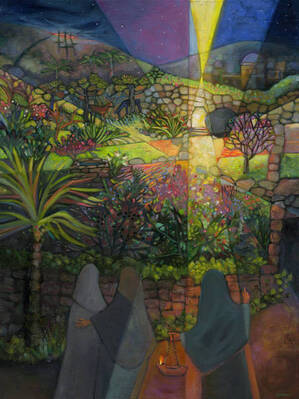 image: Jen Norton image: Jen Norton Easter Day sermons are hard to compose. How on earth do we speak of something as extraordinarily mysterious, and utterly transformative, as the Resurrection?! Part of me, and not just the liturgical Anglican, also wonders whether an Easter Day sermon is necessary at all – and maybe you feel the same, or will do after my particular words today?! After all, the Easter stories and symbolism are so rich, with so much food for thought and our spirits, as well as embodied proclamation of good news and the living Word of God. I can also only really remember two Easter Day sermons, and even their details are somewhat hazy. One I preached myself, in particularly lively circumstances: and that might be the starter for an Easter Reflection on another occasion. The other was on the first chapters of the book of Genesis and biblical critics’ theories of the Pentateuch. So that sermon was seemingly not even about Easter at all. Or was it?... 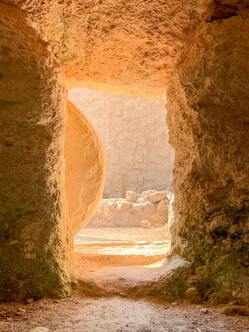 image: Psit Heng on Unsplash image: Psit Heng on Unsplash “Early on the first day of the week, while it was still dark, Mary Magdalene came to the tomb” I want to teach any children here today a special and perhaps unfamiliar word – the word is ‘liminal’. Any ideas what it means?... I checked the dictionary, and it means, “occupying a position at, or on both sides of, a boundary or threshold”. Let me show you what that means. If you come forward here and put one foot on the step of the platform here at the front, and keep one foot on the floor, then you are standing on the threshold – right on the boundary – not on the platform, and not still on the floor either. You are in the liminal place... 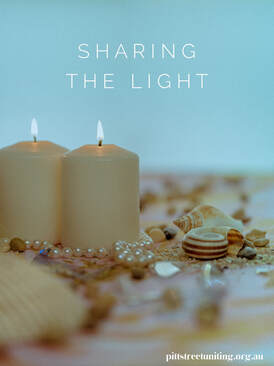 One of my grandchildren was particularly fascinated when I was in England in December. She was trying to grasp how it was night with me when it was daytime in Australia, and how it was so warm here and so cold where I was. One day, she had it sorted. Speaking to Penny on the phone, she loudly proclaimed ‘GranJo is upside down!’ I am not sure whether she thought that I was standing or walking on my head. However, in more than one sense, she was right - not least spiritually. After all, as Acts of the Apostles chapter 17 reminds us, like other early Christians, Paul and Silas were accused of ‘turning the world upside down’. It remains part of our Christian calling and sits well with the Presentation of Jesus in the Temple, otherwise known as the feast of Candlemas, which we mark today. Wherever, or whoever, we are in the world, we are all called to ‘live upside down’ in spiritual terms…  When you see an egg, do you see the risen Jesus? This is what Christians have done from the earliest times. There is an Armenian picture from the eleventh century that shows the angel and the women at the tomb with a huge egg inscribed with the words ‘He is not here. He is risen.’ So why an egg. Well firstly eggs are elliptical in shape – they are infinite, having no beginning or end, and so are symbolic for God. There is no end to God’s creativity, God’s love, God’s compassion. Secondly an egg symbolizes the potential of new life. In some sense it is a microcosm, a miniature version of everything that is. It reminds us of the potential that each of us has for new life and a new beginning, today on Easter Day and every day. Thirdly, for a chick to emerge from an egg, the shell must be broken. This symbolizes for Christians the rolling away of the stone from the front of the tomb, so that the risen Christ could emerge. It reminds us that for the new to come, the old has to be fractured and let go – an important message in these days, where so much of what is familiar to us has to be left behind. Eggs tell us that God cannot be contained; that resurrection is possible and life is stronger than death. In recent memory Christians living under the severely repressive Albanian government, used to dye eggs red for the blood of Christ in the Orthodox fashion, and then take them out in the dark of Holy Saturday night and place them on the steps of town halls and places of government. By doing so they asserted the power of love over hate. So, what do you see when you see an egg? Take a little time today to contemplate an egg and ask God to help you see there the reality of new life even in the midst of death. And look twice – for it can be a messenger of hope and resurrection to you today. Penny Jones, for Easter Sunday 12 April 2020 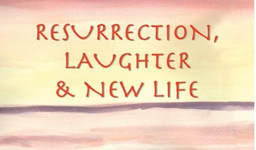 Today is April Fool’s day, and there can be no better day for foolery and laughter than Easter Day. For there is a tradition of laughter and joke telling on Easter Day that began hundreds of years ago. The story goes that a monk in Bavaria was pondering the solemn events of Good Friday and the earth shattering events of Easter Day and suddenly he had a new insight, and he began to laugh. Once he started laughing he couldn’t stop; he laughed and laughed and laughed. His hearty laughter startled his companions from their solemn contemplation and they looked at him with amazement and disapproval. ‘Don’t you see?’, he cried out, ‘it was a joke! The best joke ever. On Good Friday when Jesus was crucified, the devil thought he had won. But God had the last laugh on Easter Day when he raised Jesus from the dead.’ And the monk began to laugh again, and his fellow monks began to get it, and they laughed and it became known as the Easter laugh, and the tradition of laughing and telling jokes on Easter Day began. So I am hoping that in a little while over morning tea we can share all our best jokes and laugh together. The laughter echoing through the ages is a tangible witness to the good news of Easter- that Jesus Christ is alive among us; that death does not have the last laugh; that darkness does not conquer light. All the forces that conspired to kill Jesus, the fury, the lovelessness, the betrayal - God makes of them all a laughing stock. God laughs... 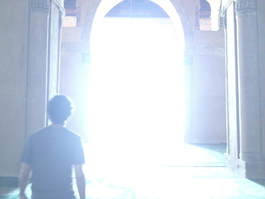 We wait at the tomb. As Gregory of Nyssa pointed out centuries ago, Jesus lies in the tomb, in order to bring to life all who lie in tombs. We pause this Holy Saturday night, on the very threshold of resurrection. The Latin word for threshold is limen, from which we derive the word liminal, to describe all those spaces and times that are ‘in between’ - the ‘not quite yet’ spaces; the crossing points from one state of being to another. Tonight is a liminal time and this is a liminal space that we have created, in order to draw near to Christ. For it is easier to draw near to Christ in a liminal time and place than in any other. Between light and dark, there is the twilight of dawn or dusk, exactly the kind of light in which the women went to the tomb on the first Easter Day. Between grief and happiness there is a space that belongs to the shy gift of joy, whose nature partakes of both. Between life and death, death and life, there is the waiting time; the time when nothing appears to be happening, but actually everything is happening. This is the chrysalis time, when the caterpillar dissolves and the butterfly emerges. The work is done inside, unseen and unknown...  In the northern hemisphere our season of Easter corresponds with spring time and the returning to life of plants and flowers from the deadness of winter. There is a natural resonance between the message of resurrection and the blossoming of the natural world.Here in the Southern Hemisphere of course things are a little different, as we enter autumn and with the shortening of the days prepare to welcome winter. For us this is a time of fruitfulness, of gratitude for all that the earth has given through the spring and summer, and of letting go. At this season the trees are letting go of their seed pods, so that what we have is not so much new life as the potential for new life. When we look at the little sunflower seeds we are been given this afternoon, it is not immediately obvious that they are even related to the magnificent sunflowers we see in the vase here. When Mary encountered the risen Jesus in the garden, she did not recognise him. He looked so different from the Jesus she knew, that she thought he was the gardener. Only his voice remained recognisable to her. He had been utterly transformed. We too are being transformed, hour by hour and moment by moment. Different aspects of ourselves are in a constant process of change and transition. We know that biologically speaking every cell of our body changes every seven years. We are not the same people we were seven years ago. Spiritually speaking we are changing and evolving too - readying ourselves at some level for the greater transformation that death and resurrection will bring. Pastor Steve Garnaas Holmes expresses it this way..... The seed of you, released in life's gracious sowing, descends in darkest soil, where the fingers of God, earthy and rank, smelling of root and rot, work open your shell, pry loose your outer being and let you spill into earth, blood outflowing its veins. Hands of darkness hold you still, deathly still, longer than you want, close and unknowing, until you are earth. The grave that enwraps you knows it is purely in the hands of the One who changes everything into life, who has the only power. In time the original light, set free, swells in you, and who you are, who God is in you, drains upward into light, and a green blade appears, reflection given by Penny Jones at the first Sanctus gathering, 29 April 2017 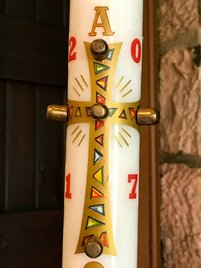 What is your favourite Easter story I wonder? I read a lovely one the other day. A teacher had asked her young pupils to write a line or two about what they were going to do over Easter. The children started scribbling away until one little boy put his hand up. ‘How do you spell gun?’, he asked. A little bemused, the teacher replied, ‘G-U-N’. The boy started writing and then put his hand up again. ‘And how’, he said, do you spell die?’ A good deal more perturbed, the teacher replied, ‘D-I-E’, and then she added cautiously, ‘what is it you are going to do?’ ‘Oh’ said the little boy, ‘it is going to be fun… we’re gun die eggs’. Well, a number of folk among us have certainly dyed eggs for today: just one of the many wonderful symbolic traditions which have grown up over the centuries around Easter. Indeed, some of these are perhaps as curious as the little boy’s spelling and grasp of language. They are certainly diverse, rather like the variety of ways in which the Gospel writers and St Paul speak about the Resurrection. Does that matter, do you think? My sense is that that is precisely as it should be. For the Resurrection of Jesus Christ is like an explosion, the impact and implications of which can never be understood and lived out by one tidy account or explanation. Rather the meaning of Easter is only something we grow into, day by day, year by year, as we reflect upon the different ways our Bible and Tradition speak of it, and, crucially, as it comes alive for us in our own lives and times… |
Authors
sermons and reflections from Penny Jones & Josephine Inkpin, a same gender married Anglican clergy couple serving with the Uniting Church in Sydney Archives
June 2024
Categories
All
|
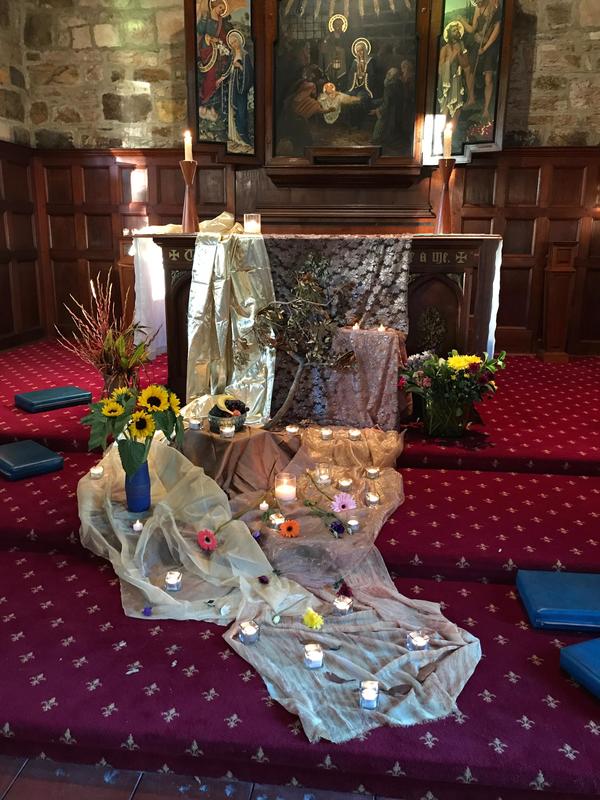
 RSS Feed
RSS Feed